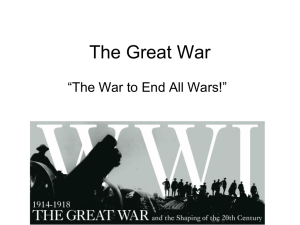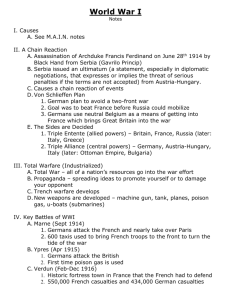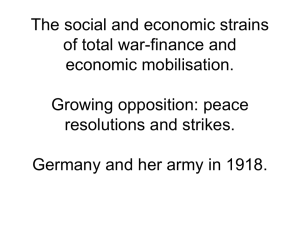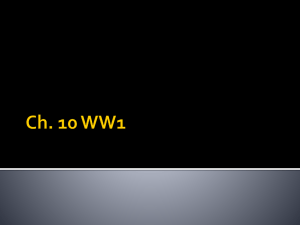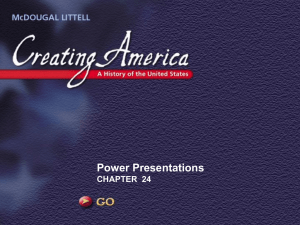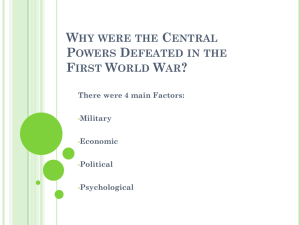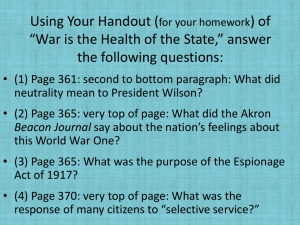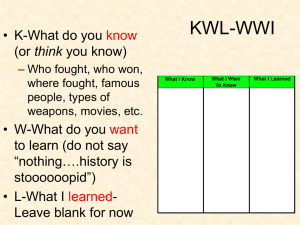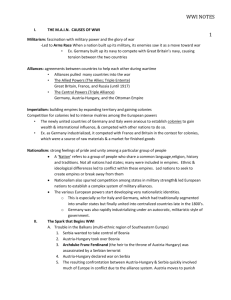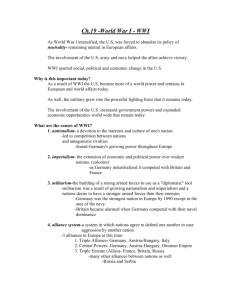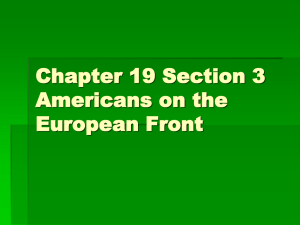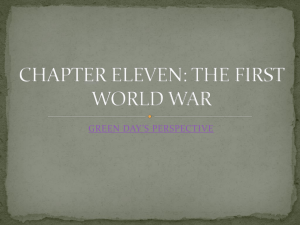Print › Chapter 19: The World War I Era (1914
advertisement
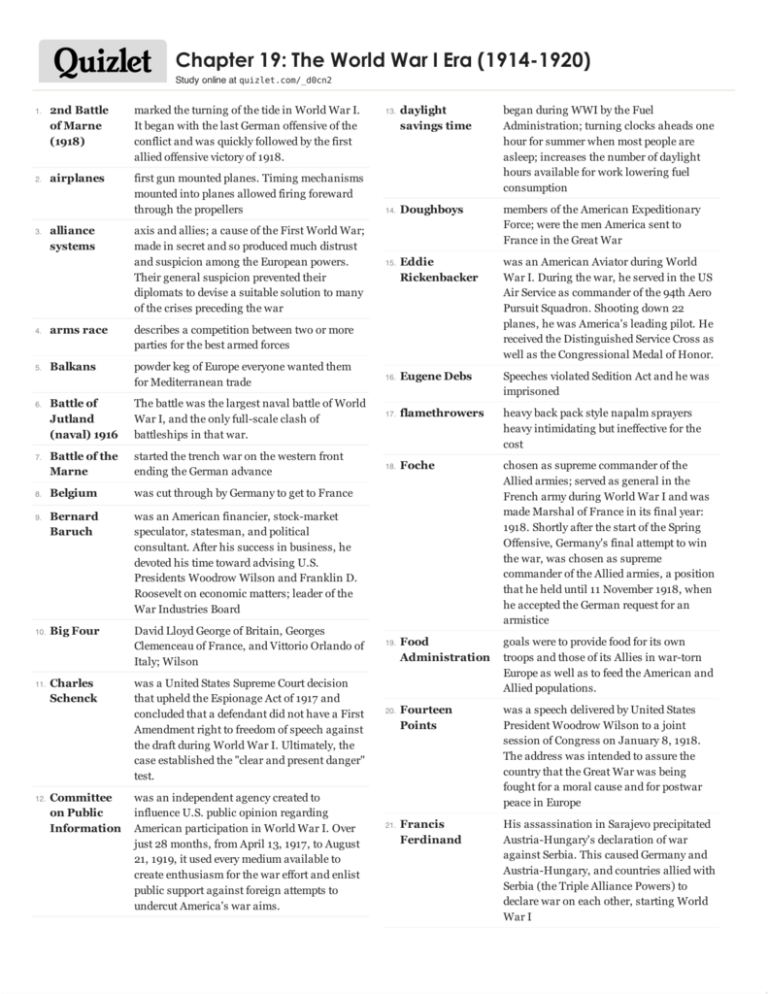
Chapter 19: The World War I Era (1914-1920) Study online at quizlet.com/_d0cn2 1. 2. 3. 2nd Battle of Marne (1918) marked the turning of the tide in World War I. It began with the last German offensive of the conflict and was quickly followed by the first allied offensive victory of 1918. airplanes first gun mounted planes. Timing mechanisms mounted into planes allowed firing foreward through the propellers alliance systems axis and allies; a cause of the First World War; made in secret and so produced much distrust and suspicion among the European powers. Their general suspicion prevented their diplomats to devise a suitable solution to many of the crises preceding the war 4. arms race describes a competition between two or more parties for the best armed forces 5. Balkans powder keg of Europe everyone wanted them for Mediterranean trade 6. 7. 8. 9. 10. 11. 12. Battle of Jutland (naval) 1916 The battle was the largest naval battle of World War I, and the only full-scale clash of battleships in that war. Battle of the Marne started the trench war on the western front ending the German advance Belgium was cut through by Germany to get to France Bernard Baruch was an American financier, stock-market speculator, statesman, and political consultant. After his success in business, he devoted his time toward advising U.S. Presidents Woodrow Wilson and Franklin D. Roosevelt on economic matters; leader of the War Industries Board Big Four David Lloyd George of Britain, Georges Clemenceau of France, and Vittorio Orlando of Italy; Wilson Charles Schenck Committee on Public Information was a United States Supreme Court decision that upheld the Espionage Act of 1917 and concluded that a defendant did not have a First Amendment right to freedom of speech against the draft during World War I. Ultimately, the case established the "clear and present danger" test. was an independent agency created to influence U.S. public opinion regarding American participation in World War I. Over just 28 months, from April 13, 1917, to August 21, 1919, it used every medium available to create enthusiasm for the war effort and enlist public support against foreign attempts to undercut America's war aims. daylight savings time began during WWI by the Fuel Administration; turning clocks aheads one hour for summer when most people are asleep; increases the number of daylight hours available for work lowering fuel consumption Doughboys members of the American Expeditionary Force; were the men America sent to France in the Great War Eddie Rickenbacker was an American Aviator during World War I. During the war, he served in the US Air Service as commander of the 94th Aero Pursuit Squadron. Shooting down 22 planes, he was America's leading pilot. He received the Distinguished Service Cross as well as the Congressional Medal of Honor. 16. Eugene Debs Speeches violated Sedition Act and he was imprisoned 17. flamethrowers heavy back pack style napalm sprayers heavy intimidating but ineffective for the cost 18. Foche chosen as supreme commander of the Allied armies; served as general in the French army during World War I and was made Marshal of France in its final year: 1918. Shortly after the start of the Spring Offensive, Germany's final attempt to win the war, was chosen as supreme commander of the Allied armies, a position that he held until 11 November 1918, when he accepted the German request for an armistice Food Administration goals were to provide food for its own troops and those of its Allies in war-torn Europe as well as to feed the American and Allied populations. Fourteen Points was a speech delivered by United States President Woodrow Wilson to a joint session of Congress on January 8, 1918. The address was intended to assure the country that the Great War was being fought for a moral cause and for postwar peace in Europe Francis Ferdinand His assassination in Sarajevo precipitated Austria-Hungary's declaration of war against Serbia. This caused Germany and Austria-Hungary, and countries allied with Serbia (the Triple Alliance Powers) to declare war on each other, starting World War I 13. 14. 15. 19. 20. 21. George Creel the head of the United States Committee on Public Information, a propaganda organization created by President Woodrow Wilson during World War I Great Migration was the movement of 2 million African Americans out of the Southern United States to the Midwest, Northeast and West from 1910 to 1930. African Americans migrated to escape racism and to seek jobs in industrial cities 24. Hoover left his position as Chairman of the Commission for Relief in Belgium and return to this country to take charge of its wartime Food Administration 25. imperialism the creation and maintenance of an unequal economic, cultural and territorial relationship, usually between states and often in the form of an empire, based on domination and subordination 22. 23. 26. 27. 28. 29. 30. influenza epidemic at home influenza epidemic on the battle front killed more people than the Great War, known today as World War I (WWI), at somewhere between 20 and 40 million people. It has been cited as the most devastating epidemic in recorded world history American troops arriving in France from military training camp in Kansas brought this with them; Of the U.S. soldiers who died in Europe, half of them fell to the influenza virus and not to the enemy. An estimated 43,000 servicemen mobilized for WWI died of influenza IWW (Industrial Workers of the World) gained strength during WWI; became the target of the government's effort to control political radicals John "Black Jack" Pershing Leader of the American Expeditionary Force during World War I Liberty Bonds a war bond that was sold in the United States to support the allied cause in World War I. Subscribing to the bonds became a symbol of patriotic duty in the United States and introduced the idea of financial securities to many citizens for the first time. The Act of Congress which authorized the Liberty Bonds is still used today as the authority under which all U.S. Treasury bonds are issued. Lusitania ship sunk by torpedo attack with 128 American passengers; made America ANGRY; torpedo attack early in WWI before tactics for evading submarines were properly implemented or understood. The contemporary investigations both in the UK and US into the precise causes of her loss were obstructed by the needs of wartime secrecy and a propaganda campaign to ensure all blame fell upon Germany. Argument over whether the ship was a legitimate military target raged back and forth throughout the war as both sides made misleading claims about the ship. At the time she was sunk she was carrying a large quantity of rifle ammunition and other supplies necessary for a war economy, as well as civilian passengers. machine guns outdated the musket loaded rifles of prior wars. Used 60 pound water drums for cooling systems for maintainable rapid fire. Made good use of trench warfare provided they didn't need to move nationalism a strong devotion to the nation no man's land the line in between armies trenches; because no man is alive there long 35. poison gas chlorine gas used to open up lines in trenches; first use of WWI was against France; a 9 mile gap was made so no one could cross it 36. propaganda is a form of communication that is aimed at influencing the attitude of a community toward some cause or position; England cut off our communications with Germany so all information came through them and our view was biased 37. rationing distributing goods to consumers in a fixed amount 38. Red Baron Manfred Albrecht Freiherr von Richthofen; was a German fighter pilot with the Imperial German Army Air Service (Luftstreitkräfte) during World War I. He is considered the aceof-aces of that war, being officially credited with 80 air combat victories, more than any other pilot Robert Prager was a German coal miner living in Collinsville, Illinois, who was lynched by a mob on 5 April 1918. Twelve men were tried for his murder but were subsequently acquitted. It has been suggested that Prager may have been singled out for his socialism, rather than his nationality 31. 32. 33. 34. 39. 40. 41. 42. 43. 44. 45. 46. 47. 48. 49. 50. 51. Russian Revolution monarchy was over thrown in Russia and was said to be making the world safe for democracy; In March 1917 a revolution overthrew tsarist regime. The second Revolution, commonly called the October Revolution, was an armed coup organized by the Bolshevik party. These revolutions were caused by and led to Russia pulling out of World War I. Sarajavo city where Francis Ferdinand and his wife were assassinated; His assassination in Sarajevo precipitated Austria-Hungary's declaration of war against Serbia. This caused Germany and Austria-Hungary, and countries allied with Serbia (the Triple Alliance Powers) to declare war on each other, starting World War I Schlieffen Plan overall strategic plan for victory in a possible future war where it might find itself fighting on two fronts: France to the west and Russia to the east. Sgt. Alvin York was one of the most decorated American soldiers in World War I.He received the Medal of Honor for leading an attack on a German machine gun nest, taking 32 machine guns, killing 28 German soldiers and capturing 132 others stalemate inability for either side to make an advance submarine tactics did not have a place in the rules of engagement and infuriated everyone except Germany submarines underwater vessels largely undefensive strong offense and excellent camouflage Sussex Pledge A promise Germany made to America, after Wilson threatened to sever ties, to stop sinking their ships without warning. tanks small caliber rounds on a non rotating mount impenetratable to rifle fire Treaty of Versailles Created by the leaders victorious allies Nations: France, Britain, US, and signed by Germany to help stop WWI. The treaty 1)stripped Germany of all Army, Navy, Airforce. 2) Germany had to rapair war damages(33 billion) 3) Germany had to acknowledge guilt for causing WWI 4) Germany could not manefacture any weapons. trench warfare warfare conducted in long trenches to prevent getting shot Triple Alliance; Central Powers Consisted of Germany, Austria- Hungary, as well as Italy. Germany, with its blank check provision to Austria- Hungary, had in encouraged the war declaration on Serbia. Afterwards, Germany declared war on Russia and France, Serbia's allies by treaties. 52. 53. 54. 55. 56. 57. 58. 59. Triple Entente: Allies Beginning in the early 1900's, Britain, France and Russia had signed treaties with each other. After Austria declared war on Serbia, Germany declared war on the allies (Russia and France), in turn drawing Great Britain into the war. This system of alliances had escalated what was once a localized incident. Victor Berger was a founding member of the Socialist Party of America and an important and influential Socialist journalist who helped establish the socalled Sewer Socialist movement. The first Socialist elected to the U.S. House of Representatives, in 1919 he was convicted of violating the Espionage Act for his anti-militarist views and as a result was twice denied the seat to which he had been elected in the House of Representatives. War Guilt Clause It forced Germany to say that they alone caused World War 1 -and that it was therefore right and proper that they had to pay reparations; was the justification for reparations. It was also widely taken to mean that Germany was a 'rogue state'. The German government was force to accept the blame that they were the sole cause of the war. War Industries Board a United States government agency established on July 28, 1917, during World War I, to coordinate the purchase of war supplies under the leadership of Bernard Baruch The organization encouraged companies to use massproduction techniques to increase efficiency and urged them to eliminate waste by standardizing products. The board set production quotas and allocated raw materials. It also conducted psychological testing to help people find the right jobs. War Labor Board was a federal agency created in April 1918 by President Woodrow Wilson. It was composed of representatives from business and labor, and chaired by Former President William Howard Taft. Its purpose was to arbitrate disputes between workers and employers in order to ensure labor reliability and productivity during the war. It was disbanded after the war in May, 1919. War Trade Liberty Bonds Established by Wilson controlled imports and exports William H. Taft former President who headed the War Labor Board Yanks Name Europeans gave to American soldiers 60. Zimmerman Note a message intercepted by British intelligence from Germany to Mexico in 1917 proposing that in the event of a German war with the United states, Mexico should attack the US. It would be a Mexican opportunity to retake the Mexican Cession. This was one of a few events which led to widespread public support for the Allies and eventual United States involvement in the World War.
